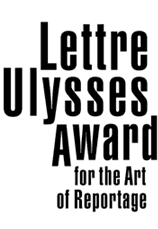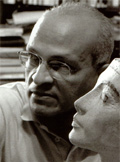
Gamal al-Ghitany, Egypt
 “I reject unequivocal labels, like those who speak of an absolute Occident, or a fixed Orient. There is not just a single Occident, nor a single Orient; on the contrary, we learn to see that the sinking of the sun on the horizon is a process that continues throughout the year, which cannot be the possession of one region to the exclusion of the others. It arises from the spray of the dawn, as our ancestors, the ancient Egyptians, already saw millennia ago. There are sensible voices in the Occident, who know that the richness of humanity is to be found in the intermingling of its cultures and the complementariness of its elements, and not in building one sole culture and smashing the others.”
“I reject unequivocal labels, like those who speak of an absolute Occident, or a fixed Orient. There is not just a single Occident, nor a single Orient; on the contrary, we learn to see that the sinking of the sun on the horizon is a process that continues throughout the year, which cannot be the possession of one region to the exclusion of the others. It arises from the spray of the dawn, as our ancestors, the ancient Egyptians, already saw millennia ago. There are sensible voices in the Occident, who know that the richness of humanity is to be found in the intermingling of its cultures and the complementariness of its elements, and not in building one sole culture and smashing the others.”
Novelist, essayist, writer. Gamal al-Ghitany was born in 1945 in the village of Guhayna, in Upper Egypt, and moved with his family to Cairo as a child. He spent his first thirty years there, in the old “Islamic Cairo,” where his interest in Arab and Islamic heritage began to grow. After completing school, he spent three years training an oriental carpet designer and received his diploma in 1962.
Al-Ghitany wrote his first short story when he was fourteen years old, and gained his real start as a writer of short stories and novels in the 1960s. His journalistic and literary texts have appeared in Egyptian and Lebanese newspapers since 1963. In 1966/67 he was held in a prison camp for six months due to his criticism of the regime of President Nasser. He subsequently found work as a clerk at the artists’ trade union at the Chan al-Chalili bazaar in Cairo.
In 1969, al-Ghitany began his career as a journalist at the Akhbar al-Youm daily newspaper, for which he reported as a correspondent from the Yom Kippur war fronts in 1973. He also travelled to war zones in Iraq, Iran and Lebanon, before being ordered to stop his work by Egypt’s President Sadat. Al-Ghitany published a biography of Nagib Mahfouz in 1980 in Beirut. In the same year, he was awarded Egypt’s State Prize for Novels, a Merit of Science and Arts – First Degree.
In 1985, he became head of the cultural section of the Al-Akhbar daily newspaper, where he had his own column, and he also supervised the Akhbar al-Youm newspaper’s monthly book section. In 1987, he was named Chevalier des Arts et Lettres in France. He is chief editor of the Egyptian literary weekly Akhbar al-Adab (Literature News Newspaper), a position he has held since 1993. Al-Ghitany publishes texts by incriminated authors in the journal, so far without hindrance by official censors.
Al-Ghitany’s books have been published in many languages, including English, French, German, Italian and Hebrew. His collected works were issued in six volumes in Cairo (1990-1996). The Cairo of Naguib Mahfouz was published by the American University in Cairo Press in 2000. The same publisher issued Zayni Barakat in 2005. Al-Ghitany is currently working on a cycle of novels of which three volumes have already been published, based on the theme of “revival of memory.” His novel Le Livre des Illuminations (1990) (Kitab al-Tajalliyat) was awarded the Laure Bataillon Prize in 2005 for the best work of fiction translated into French that year. The prize was awarded to al-Ghitany and to Khaled Osman, who translated the novel from Arabic into French. In 2006, he received the Italian Premio Grinzane Cavour for his collection of stories entitled Schegge di fuoco.
Al-Ghitany has lectured at numerous universities throughout the world, and has participated in many international conferences. In 2004, he was the guest of honour at the International Frankfurt Book Fair. He speaks Arabic, English and French, and lives in Cairo.
